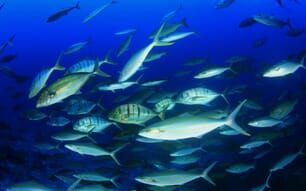The National Federation of Fishermen's Organisation's, which along with other fisheries stakeholders participated in the annual State of the Stocks review in Brussels, said: "The recovery trajectory for some species - plaice and hake for example - is nothing less than remarkable. Right across the board, with very few exceptions, we are seeing strong signals from the stocks and this is now reflected in the scientific stock assessments.
“We could point to 20 or 30 separate measures which have contributed to this positive trend, which began around the year 2000, including more selective fishing and smaller fleet sizes; but of course natural fluctuations also play an important part in what we are now seeing."
According to the new statistics released this week by the International Council for the Exploration of the Sea (ICES), there has been a ‘dramatic reduction in fishing pressure’ across the main commercial stocks, with the majority observing that fishing mortality has decreased to a level consistent with Maximum Sustainable Yield (MSY). This means levels are not only sustainable but will also deliver high long term yields.
Encompassing around 150 stocks, the new data shows a dramatic reduction in the exploitation level of many species, as a result of the strict management objectives now in place for sustainable fisheries across the North Atlantic. Between 2006 and 2015, the number of stocks fished at MSY increased from 2 to 36.
Barrie Deas, Chief Executive of the NFFO said: “The science this year reinforces the trends that we have seen across all the main species groups since 2000 and is a welcome culmination of the efforts made by individual fishermen over the past decade.
“The advice paints a positive picture of dramatic reduction in fishing pressure which has resulted in stock levels responding positively. This is welcome news for both the UK’s fishing industry, as well as those of us who look to fish as a sustainable, traceable and healthy food source.
“The last decade has been a difficult and challenging time for the UK industry and fishermen have had to go through a major attitudinal shift to keep the industry afloat. Sustainability is now at the heart of the way the fishing industry operates and these figures are a major endorsement of the way practices have changed over the last decade.”
On releasing the figures, Chair of ICES Advisory Committee, Eskild Kirkegaard, commented: “Over the last ten to fifteen years, we have seen a general decline in fishing mortality in the North East Atlantic and the Baltic Sea. The stocks have reacted positively to the reduced exploitation and we’re observing growing trends in stock sizes for most of the commercially important stocks.”
In 2013, the UK’s 6,399 fishing vessels landed 624,000 tonnes of fish (including shellfish) with a value of £718 million. There are around 12,150 fishermen, over 10,000 of whom are working full time.
Arnold Locker is a fourth generation fisherman based in Whitby. He has over 40 years’ experience of commercial fishing in the North Sea and is co-owner and chairman of Lockers Trawlers, which now trawls haddock predominantly, after taking the decision to actively avoid cod to support its recovery.
Arnold was among the first fishermen to join scientific missions to collect accurate data to compare catch rates with different gear. Since 2002, Lockers Trawlers has trialled avoidance techniques including smaller net and mesh sizes, and now operates with a bycatch rate of less than one per cent, verified by onboard CCTV under the Fully Documented Fisheries (FDF) scheme.
He commented: “Over the last few years, we have seen a real increase in the amount and variety of the fish we are catching and it is reassuring to see the science has caught up with what we are seeing in our nets. This progress just goes to show the major impact fishermen working closely with scientists can have as well as the sustainability measure we have worked hard to put in place.
“There has been a significant price to pay for fishermen and coastal communities across the North East coast with many fishing businesses decimated by decommissioning schemes and struggling to stay afloat. This stock recovery is testament to the hard work and commitment of the fishermen themselves and the acknowledgment from the Commissioner is something we’ve been waiting to hear since 2002.
“As a family business, we’ve worked hard over the last ten years to secure a legacy for future generations to continue to provide what is a vital and sustainable food source for our island nation. At last, it’s starting to pay dividends in both the quality and quantity of the fish we’re catching.”


